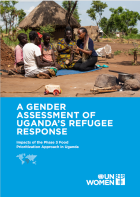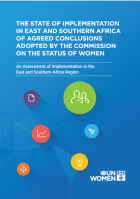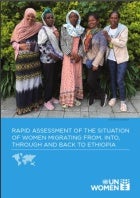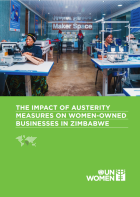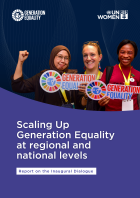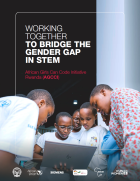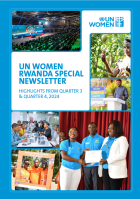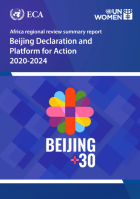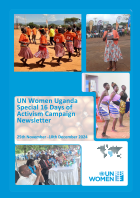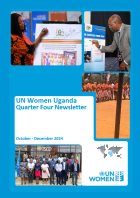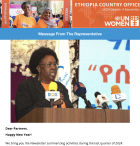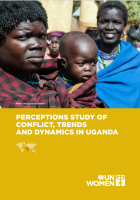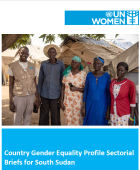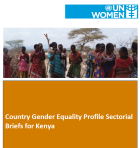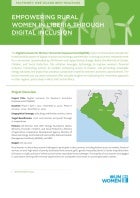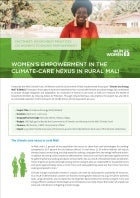Date:
Uganda’s refugee policy is progressive, yet women and children remain highly vulnerable. Since 2022, food aid cuts have severely impacted female headed households. A gender assessment across eight districts highlights these challenges, showing the disproportionate effects on livelihoods, education, and protection. Key recommendations include promoting alternative livelihoods, improving education access, strengthening GBV support, enhancing food security measures, and fostering peaceful coexistence with host communities to ensure sustainable empowerment and gender-responsive aid.
Date:
The Commission on the Status of Women (CSW) monitors gender equality commitments and the Beijing Declaration. A study by UN Women East and Southern Africa assessed CSW63–CSW66, finding strong treaty ratification but weak policy implementation. Challenges include inadequate funding, weak national preparations, and limited African influence in CSW negotiations. Recommendations include strengthening coordination, enhancing stakeholder engagement, and improving CSO participation to boost Africa’s impact in global gender equality discussions.
Date:
The rapid assessment provides an analysis of the situation of women migrating from, to through and back to Ethiopia based on existing literature and a review of relevant policies, legal frameworks and services related to migration governance in Ethiopia, with a gender lens. The assessment also proposes recommendations to strengthen the rights of migrant women at all stages of migration.
Date:
Drawing on the policy brief on advancing the rights of Ethiopian migrant women domestic workers the infographic illustrates the risk and realities facing Ethiopian women migrating for domestic work at all stages including pre-departure, during the journey, at country of destination and upon return and provides insights for action.
Date:
This study examines the impact of Zimbabwe’s austerity measures (2018-2023) on women owned MSMEs. Most businesses are informal, survivalist, and struggle with financial exclusion, low capital, and limited government support. Only 2 per cent export due to financial and logistical barriers. The study recommends gender-responsive policies, business formalization, financial inclusion, skills training, and export support to improve economic opportunities for women entrepreneurs.
Date:
In Uganda, significant strides have been made toward gender equality, yet challenges persist. A robust policy framework exists, but inequality and gender-based violence remain prevalent. To address these issues, a collaborative campaign has been initiated by female heads of diplomatic missions and UN agencies, and male changemakers from various sectors including the Government of Uganda.
Date:
The transition to a low carbon economy is leading to important socioeconomic transformation in sub-Saharan Africa. The green transition can help governments align their development strategies. Gender equality and women’s and youth employment are critical priorities. This toolkit helps stakeholders involved in the process of formulation or revision of climate change and green policies (i.e. NDCs or NAPs) to identify opportunities to maximize co-benefits of gender equality and climate action.
Date:
This report summarizes the discussions, outcomes, and recommendations from the Generation Equality Dialogues “Advancing Generation Equality Through Local Action: Scaling up Generation Equality at national and regional levels” held on September 12, 2024.
Date:
This report showcases the transformative journey that the AGCCI alumni in Rwanda have embarked on, paving way to becoming the innovators and change makers of the present and future.
Date:
This newsletter highlights some of UN Women`s key milestones made in advancing gender equality and women`s empowerment in Rwanda in the period of July - December 2024
Date:
The message that "Women’s rights are human rights" was strongly affirmed in the 1995 Beijing Declaration and Platform for Action (BPfA). Serving as a roadmap, the BPfA outlined clear objectives to tackle 12 critical issues impacting women and girls, including education, health, economic empowerment, political participation, and human rights. As the world marks the 30th anniversary of the BPfA in 2025, it serves as a solemn reminder that, despite progress, we are still far from fully achieving its goals.
Date:
The national launch for the 16 Days of Activism Against Gender-Based violence in Uganda
Date:
This year marks 30 years since the adoption of the landmark global framework to advance gender equality and women’s empowerment worldwide.
We delighted to share with you the 4th quarter newsletter of 2024.This edition celebrates another impactful year, highlighting our collective strides in empowering women and girls across Uganda.
The past three months have been a time of reflection and action. From commemorating the 16 Days of Activism Against Gender-Based Violence (25 November to 10 December), we have witnessed the power of partnerships in driving transformative change. These moments remind us that every step forward, no matter how small, contributes to a future where every woman and girl can live free from discrimination and violence.
Date:
Happy New Year!
We bring you the Newsletter summarizing activities during the last quarter of 2024. As we gear towards continuing our work of empowering women and girls with a renewedspirit for 2025, we reflect on how 2024 has been for GEWE work. At UN Women EthiopiaCountry Office, we concluded the year with a vibrant commemoration of 16 Days of activism.The annual Unite Campaign brought together government entities, sister UN Agencies, CSO,Women Led organizations among others. It was yet another opportunity to collaborate andrenew commitment to work for betterment of the lives of women and girls in Ethiopia.
Date:
Since independence in 1962, Uganda has faced ongoing conflicts, marked by violence and gender-based violations. The government supports the Women, Peace, and Security (WPS) Agenda, rooted in UNSCR 1325, emphasizing women’s participation in peacebuilding and conflict resolution. Through National Action Plans, Uganda seeks to protect women’s rights, address post-conflict needs, and promote sustainable peace, though challenges persist in rehabilitation and reconstruction efforts.
Date:
In 2022, MGCSW and UN Women South Sudan developed the Country Gender Equality Profile, highlighting progress and challenges in gender equality, women’s rights, and governance. The study calls for increased funding, legal reforms, and socio-economic initiatives to address issues like illiteracy, violence, and limited access to services. Collaborative action by the government, UN agencies, and civic groups is essential for promoting gender equality and safeguarding women’s rights. Key recommendations include allocating funding for violence survivors, establishing the Women Enterprise Fund, reviewing the Girl Child Act, and expediting gender-related laws. The government should lift social media bans, provide platforms for women’s voices, and promote women’s inclusion in constitution drafting. Efforts should also focus on disseminating the Maputo Protocol and defining the minimum marriage age to safeguard gender equality and women’s rights.
Date:
While progress has been made in gender equality policies and peacebuilding, women face structural barriers. The study recommends strengthening legal frameworks, institutional structures, and socio-economic initiatives, urging collaboration among government, UN agencies, civil society, and partners to advance gender equality and women’s empowerment.
Date:
These policy briefs, form part of the Country Gender Equality Profile (CGEP), evaluates gender equality in Kenya, offering evidence-based insights for stakeholders to advance commitments to Gender Equality and Women’s Empowerment (GEWE). Guided by the EU Gender Action Plan 2021–2025, they promote inclusive, transformative approaches to inform programmes, policies, and actions, addressing diverse gender needs and advancing Kenya’s Sustainable Development Goals (SDGs) through national and county-level collaboration.
Date:
This publication is part of the WEE WCARO Best Practices series. The Digital Inclusion for Women’s Economic Empowerment (D4WEE) project in Liberia demonstrates the transformative power of digital inclusion and strategic partnerships in driving economic empowerment for rural women. Rural women face challenges to participate in the economy, including limited access to markets, financial services, or land. By connecting women to markets, enhancing access to finance, and promoting renewable energy solutions, the project leverages technology to improve women’s financial inclusion.
Date:
This publication is part of the WEE WCARO Best Practices series. The ‘‘Climate and Energy Mali” (CEMALI) project trained women in the production of improved cookstoves and sustainable fuels, reforestation activities, forestry management, and improved and efficient carbonization techniques. The project has contributed to climate change mitigation and adaptation, a reduction of women’s unpaid care work, and improved health of household members. This factsheets outlines the project's approach and results.

